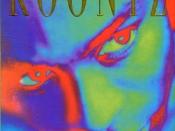As the travelers hikes through the inner journey, he would no doubt be confronted by his deepest fears, and for PiÃÂs his inner journey begins when ÃÂeverything he values in life is destroyedÃÂ and thus ÃÂhe is orphaned in the middle of the PacificÃÂ. With no sense of belonging to the situation, heÃÂs understandably afraid, and this is reflected on the darker tone and the use of short, skeletal sentences running parallel its imagery of ÃÂ being swallowed by the abstract black darknessÃÂ together with its conceit of death, gives an insight to PiÃÂs fractured state of mind. The fear of the uncertainty is also shown in ÃÂA tree fallen across the roadÃÂ, where the speaker of the poem, which through its inclusive nouns happen to be the responder, ÃÂhearÃÂ, ÃÂCrash of woodÃÂ then right after we ÃÂseeÃÂ ÃÂthrows down in front of usÃÂ. This use of active imagery combined with the onomatopoeia, reflects the sudden surprise of the traveler, of being approached by the fear.
Disaster strikes when we let the fear take control of us. I describes, fear as ÃÂthe only lifeÃÂs true opponentÃÂ and competently compares the elopement of fear as a battle between two forces, The personification and the abstract imagery accentuates the devious qualities of being consumed by fear. I In ÃÂA treeÃÂ ÃÂ the fear is described as a falling log, and this fear brought to life by the tempest its is described. This use of metaphoric technique reveals to the composer that fear has a mind of its own, it acts its own way. This inhibits the movement of the travelers to the journeyÃÂs destination.
Thus, the only way forward in an inner journey is to control our fear. For Pi the physical manifestation of all his fears is Richard Parker, the five hundred pound tiger, and crazily enough, comes to understand that ÃÂit was not me and him, it was him and meÃÂ. Thus the only way to guarantee his survival was by say taming the tiger. While not explicitly mentioned, the implement of this idiom, ironically helps us to further understand the ferocity of the fear. After he decides to overcome his fear, Pi says that ÃÂhis fear was dominated, and thus ÃÂhis panic was gone.ÃÂ This story, of life of pi is notable for its metaphysical structure, and through its flashbacks, Martel himself, states that ÃÂthis story will have an happy endingÃÂ, and throughout this story of conflicting interpretations, reveals to us the core importance of the inner journey, the willingness of a human to overcome his fear, and thus is an allegory to the human condition.
This theme is paralleled in ÃÂA tree...ÃÂ, in which the composer uses the tree is a symbolic gesture for an universal fear, thus the inclusive pronouns in the poem, such as we, and us. In the beginning of stanza three, comments that ÃÂYet, she knows the obstruction is in vain, we will not be put off by our final goal.ÃÂ Once again, the composer uses the personification to bring fear to life, explicitly states that the fear will not be able to put us off our final goal, thus humanity will overcome the battle with fear. This explicit statement contrasts with the vagueness of the rest of the poem, and thus shows us that the only certainty and the most important part is the humanÃÂs ability to overcome their fears.
Martel, Yann(Life of Pi)[2001]www.en.wikipedia.org/robert_frostwww.en.wikipedia.org/life_of_pi





